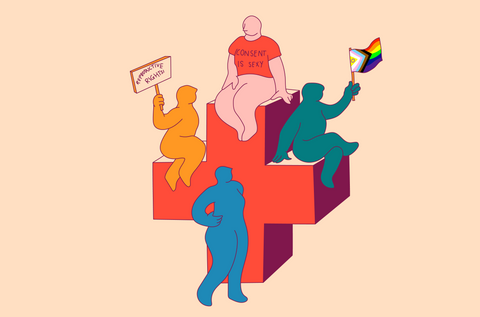We know that access to contraception can play a huge part in achieving gender equality. But we think that contraception equality is also a topic worth discussing.
When we talk about contraception equality, we’re imagining a future in which all parties in a sexual relationship take equal or fair responsibility for contraception. Often, decisions around contraception are considered the responsibility of the partner who can get pregnant (most often a cis woman) or the partner who ‘needs it’ (for example, a partner who likes to use lube will often be responsible for purchasing lube, or a partner who uses condoms will be solely responsible for sourcing them).
We don’t think this is completely fair. So today, we’re going to talk about contraception equality: why we need it, what happens if we don’t have it, and how we can achieve it.
**
Historically, contraception has been considered a ‘woman’s issue’. Part of this is because of the fact that many contraception methods were designed for use in a female body, such as IUDs, implants, and the birth control pill.
Of course, it makes total sense for cis women and people with a uterus to be educated on, and responsible for, their own contraceptive choices—we’re all for that! But we also think that making contraception ‘just’ a woman’s job, or ‘just’ the job of one partner, puts an unfair amount of stress on them. It infers that they’re solely responsible for preventing pregnancy, and that sexual health is primarily a woman’s concern. It can also lead to a sense of shame or secrecy around contraception, and that’s definitely not something we’re in favour of.
Contraception equality is about both partners taking an interest in contraception, and discussing what works for them as a team. Both partners should be aware of the pros and cons of the contraception methods available to them, and both should take a role in discussing and taking responsibility for contraception. We believe this can create a greater sense of trust, responsibility, and understanding in relationships—and it means that one partner isn’t dealing with the responsibility of contraception alone!
If you’re keen on achieving contraception equality in your relationship, read on for our roadmap to get there.
Start by having an open dialogue. Talk to your partner about contraception and safer sex, and hear their concerns, opinions, and needs. Ask them about what methods they prefer, and what methods they like to avoid—and why. Share your opinions and beliefs as well so you can both develop an understanding of each other’s perspectives.
Consider your contraception goals. It sounds like an obvious question, but: why are you using contraception? Is it to prevent pregnancy, avoid STIs, or another reason altogether? Speak with your partner to work out a ‘contraception goal’, which will help you decide what methods of contraception will be best for you.
Speak to a medical professional. If you’re feeling unclear about contraception, want some more information, or want a neutral perspective, speak to your GP. They can provide you up-to-date information on contraceptives, and discuss what options may or may not work for you.
Explore contraception options for both partners. It’s sometimes recommended to use two forms of contraception, such as the birth control pill and condoms. This isn’t just for equality’s sake, either—it offers maximum protection against STIs and unwanted pregnancy. Remember your ‘contraception goal’ and ask yourself if it would be more easily reached if both of you used a form of contraception, rather than just one of you.
Educate yourselves. As you’re exploring different methods of contraception, educate yourselves on the risks and rewards of each. This knowledge can help you make better decisions and avoid misconceptions or misinformation around contraception.
Support each other. If one (or both!) partners are using a form of contraception that can involve some side effects like mood changes or irregular periods, the other partner should offer them their support and understanding. This could include attending doctor’s appointments with them, helping them track usage, or offering support if they experience side effects.
Share the costs. If it’s practical, share the costs of contraception in a way that feels fair and equal to you.
Check-in regularly with each other. Take the time to have regular check-ins with each other about how the contraception you’ve chosen is working for you. Discuss the pros, cons, and side effects (if any), and let each other know how you feel about using it. If you feel it’s time for a change or you have questions for your GP about the contraception you’re using, you can attend an appointment together to discuss it.






